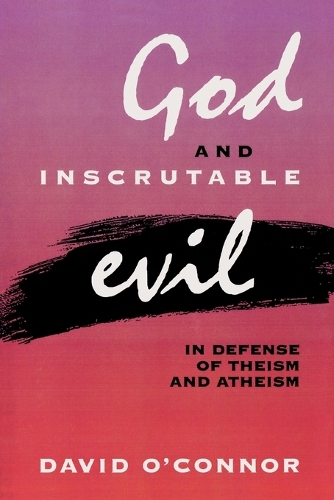
God and Inscrutable Evil: In Defense of Theism and Atheism
(Paperback)
Publishing Details
God and Inscrutable Evil: In Defense of Theism and Atheism
By (Author) David O'Connor
Bloomsbury Publishing PLC
Rowman & Littlefield Publishers
4th December 1997
United States
Classifications
Tertiary Education
Non Fiction
Agnosticism and atheism
231
Physical Properties
Paperback
288
Width 153mm, Height 229mm, Spine 23mm
463g
Description
In this important new book, David O'Connor discusses both logical and empirical forms of the problem of inscrutable evil, perennially the most difficult philosophical problem confronting theism. Arguing that both a version of theism ("friendly theism") and a version of atheism ("friendly atheism") are justified on the evidence in the debate over God and evil, O'Connor concludes that a warranted outcome is a philosophical dtente between those two positions. On the way to that conclusion he develops two arguments from evil, a reformed version of the logical argument and an indirect version of the empirical argument, and deploys both against a central formulation of theism that he describes as orthodox theism. God and Inscrutable Evil makes a valuable contribution to contemporary debates in the philosophy of religion.
Reviews
[A] careful . . . analysis of the challenge that the existence of evil presents to 'orthodox theism' . . . a remarkable amount of material in compressed format, something that will well serve readers. -- T. Michael McNulty, S.J., Marquette University, Milwaukee * Theological Studies *
This book will appeal to anyone who has ever asked why there seems to be so much unnecessary evil and suffering in the world. * Perspectives on Science and Christian Faith *
The book is full of creative thought experiments, detailed and incisive argument, and exposition and analysis that reveal an impressive command of much contemporary literature on this topic. -- R.D. Geivett, Biola University * Choice Reviews *
The most important book-length treatment of its kind in the past twenty years . . . O'Connor's book will most certainly be the locus of debate for years to come. -- Daniel HowardSnyder, Seattle Pacific University
. . . excellent work . . . chock-full of original, creative analyses and arguments. -- Del Kiernan-Lewis, Morehouse College * The Journal Of Religion *
A number of O'Connor's arguments are persuasive.
O'Coonor's central argument against Schlesinger's 'No-Best-Possible-World-Defence' seems well-taken.
This book is an substantial contribution to contemporary discussion of the evidential force of the fact of evil and the rationality of beleiving in God. * Mind: A Quarterly Review of Philosophy *
O'Connor should be praised for forcefully bringing to our attention the centrality of the standard assumption in the debate over God and evil. * The Philosophical Review *
Author Bio
David O'Connor is professor of philosophy at Seton Hall University and the author of The Metaphysics of G. E. Moore.
